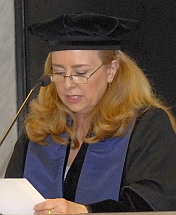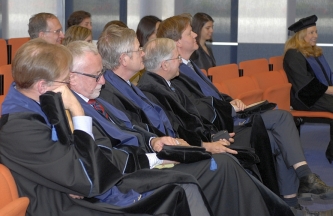Towards a New Agenda for the Study of International Business: Integrating Markets, Institutions and Politics
On June 17, <link people suzana-rodrigues _blank>Suzana Rodrigues, Professor of International Business and Organisation has held her inaugural address, entitled: “<link erim events _blank>Towards a new agenda for the study of business internationalisation: integrating markets, institutions and politics.”
 The central theme of this address was that when accessing foreign markets and investment opportunities, firms have to rely on the cooperation of host country governments and institutions, and must therefore manage their relationships, whether directly or indirectly. Business is indeed becoming increasingly international and governments are becoming more interventionist. Moreover, emerging economies are playing an increasing role in international business. These economies have developed a tradition of closer relations between business and governments than western developed economies tend to exhibit. Taken together, these factors show why, in order to understand how firms become successful internationally, we need to understand how they relate to governments.
The central theme of this address was that when accessing foreign markets and investment opportunities, firms have to rely on the cooperation of host country governments and institutions, and must therefore manage their relationships, whether directly or indirectly. Business is indeed becoming increasingly international and governments are becoming more interventionist. Moreover, emerging economies are playing an increasing role in international business. These economies have developed a tradition of closer relations between business and governments than western developed economies tend to exhibit. Taken together, these factors show why, in order to understand how firms become successful internationally, we need to understand how they relate to governments.
During her address, Rodrigues has argued that any vision of business organisations which neglects politics is amorphous, as the specific process which gives it momentum and coherence will be missing. Rodrigues has drawn upon interesting examples from China, Brazil and other countries on negotiations between firms and governments She makes a distinction between small and large firms; while some firms (usually large multinationals) have the status to establish direct relationships with foreign governments, others (mainly small companies) have little power to do so, and yet, find ways to negotiate with governments indirectly, in most ingenious and innovative ways.
Finally, she postulated that the relations between firms on the one hand, and national/international governments and institutions on the other (and in particular the extent to which each party can influence the agenda of the other) should be at the forefront of international business studies.
About Suzana Rodrigues
Suzana B. Rodrigues is Professor of International Business and Organization and Scientific Director of the Erasmus Centre for Emerging Economies. She is a member of ERIM. Her research focus is on understanding international business in emerging economies, with particular reference to Brazilian multinationals and small firms, and their relationships with local and host countries. Prior to joining Erasmus University, Suzana was Professor of International Management and Organization at Birmingham University, UK and at UFMG, Brazil. At Birmingham, Suzana was one of the founders and Director of the MSc International Business. She was also a founder and Director of CIBOR – Centre for International Business and Organization Research at the University of Birmingham. She was elected a Visiting Fellow of Lucy Cavendish College, Cambridge and in 2002 was invited to become a visiting fellow of St. John's College, Cambridge. Suzana held a visiting position at Guanghua School of Management and is currently visiting scholar at FUMEC University Brazil. Prior to joining Erasmus University, Suzana was Professor of International Management and Organization at Birmingham University, UK and at UFMG, Brazil. At Birmingham, Suzana was one of the founders and Director of CIBOR – Centre for International Business and Organization Research at the University of Birmingham. Suzana has received several awards for her contributions to the development of management knowledge and education in Brazil. This year she received an award from the Brazilian Association of Organization Studies for her contribution to the field. In 2009, she received the Terry Book Award from the AOM for an outstanding contribution to management knowledge. She has published several books and articles in peer reviewed journals in international business, corporate governance and organization studies. Her work has appeared in Human Relations, Journal of International Management, Journal of Management Studies, Management and Organization Review, Management International Review, and Organization Studies.
Abstract of the Inaugural Address
Business is becoming increasingly international. At the same time, governments are intervening more in the conduct of business. A further development is the growing significance of emerging economies, many of which have a tradition of active government involvement with business. Taken together, these trends make it imperative to understand the relationships between firms and their institutional contexts. Conventional theories adopt an over-rationalized view of these relationships international business. Their apolitical perspective misses the fact that in order to build and maintain international operations, firms need to develop political relations with governments and institutions in home countries and abroad.
 The aim of this lecture is to develop an alternative perspective with particular reference to the internationalization of firms, large and small. This considers how multinationals gain international positions through bargaining power with foreign governments. By contrast, SMEs face liabilities in dealing with foreign governments and instead often have to achieve internationalization through networking with other SMEs, with domestic communities and support agencies via various forms of social innovation. The lecture concludes that political and social innovation perspectives open new research avenues in the field of international business.
The aim of this lecture is to develop an alternative perspective with particular reference to the internationalization of firms, large and small. This considers how multinationals gain international positions through bargaining power with foreign governments. By contrast, SMEs face liabilities in dealing with foreign governments and instead often have to achieve internationalization through networking with other SMEs, with domestic communities and support agencies via various forms of social innovation. The lecture concludes that political and social innovation perspectives open new research avenues in the field of international business.
More Information
Pictures of the Event
Full Text of the Inaugural Address


